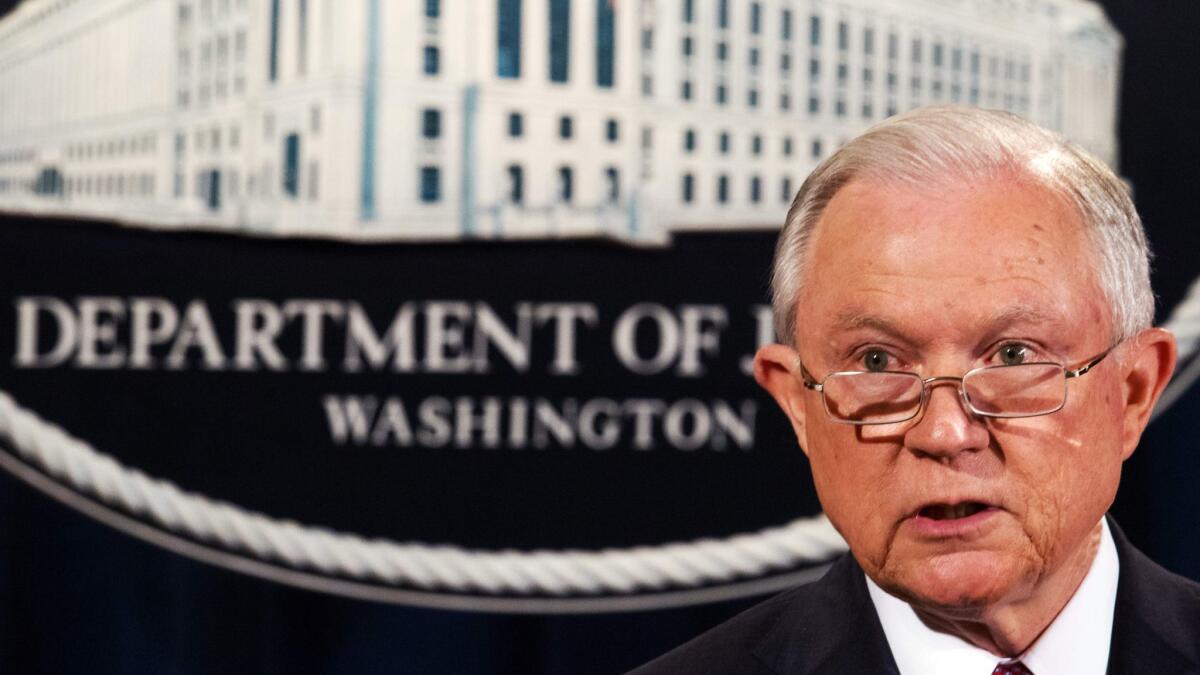Trump lawyers press Supreme Court to act fast on ‘Dreamers’ and abortion dispute

- Share via
Reporting from Washington — The Supreme Court meets Friday to decide on a pair of unusually aggressive appeals from Trump administration lawyers who are trying to leapfrog lower courts by urging justices to rule quickly on the fate of “Dreamers” and on an abortion dispute involving young migrants.
In the one case, they derided the federal judge in San Francisco who temporarily blocked the administration’s plan to end the Obama-era policy that shielded young immigrants who were brought to the country illegally when they were children. They urged the high court, for the first time in nearly 30 years, to review and reverse the district judge’s decision before an appeals court could weigh in.
“The court’s immediate review is warranted,” said Solicitor Gen. Noel Francisco. “The district court’s unprecedented order requires the government to sanction indefinitely an ongoing violation of federal law being committed by nearly 700,000 aliens.”
He was referring to a Jan. 8 decision by U.S. District Judge William Alsup who said the government did not have proper legal basis for ending the program. A second judge in New York handed down a similar ruling Tuesday.
In response to the solicitor general’s appeal, lawyers for the California plaintiffs noted that President Trump has repeatedly said he wants to preserve protections for the so-called Dreamers. They argued that the court should not intervene now when Congress is debating proposals to extend the Deferred Action for Childhood Arrivals, or DACA, program.
In the other case, administration lawyers are asking the justices to consider “disciplinary action” against lawyers for the American Civil Liberties Union who helped a 17-year-old migrant girl obtain an abortion early one morning in October after a federal judge had cleared the way. The young woman had crossed the border illegally and was held in a detention center in Texas. Early last year, Trump officials at the Office of Refugee Resettlement decided they would not “facilitate” abortions by allowing pregnant young women like her to see a doctor who could perform an abortion.
But they lost before a federal judge and the U.S. court of appeals in Washington, which ruled that government officials could not prevent the 17-year-old, dubbed Jane Doe, from obtaining an abortion paid for with private funds.
Trump’s lawyers said they had intended to rush to the Supreme Court seeking an emergency order to stop the abortion but said they were “misled about the timing” of the procedure. They thought the abortion would not take place until the next day.
Atty. Gen. Jeff Sessions said he was “disturbed” by what happened. “This was a total surprise,” he told a Fox News program.
A week later, Francisco filed an appeal asking the Supreme Court to review the matter. “Given the extraordinary circumstances,” the court should consider discipline or sanctions against the ACLU lawyers “for what appear to be material misrepresentations and omissions to government counsel,” he said. He also said the court should “vacate” or wipe away the lower court rulings in the case.
In their response to the Supreme Court, lawyers for the ACLU said the government was misleading the court. They said lawyers working on the case “made a series of accurate statements” to government lawyers about the young woman’s appointment with the doctor. They said government officials wrongly assumed the doctor would not perform the abortion early on the morning after the judge’s ruling.
In an interview, the ACLU’s legal director, David Cole, called the solicitor general’s request for disciplinary action “a low blow. There is no basis for sanctions. I haven’t seen anything like this in many years of practice. They did not point to any false statement or misrepresentation by anyone. I’m disappointed they went to such lengths to impugn attorneys who were doing their job to protect an undisputed constitutional right.”
The justices considered the appeal in the abortion case, Hargan vs. Garza, three times in January and rescheduled it for the private conference on Feb. 16. This suggests they may be divided on how to proceed, or the dissenters are writing a response. If the court has reached a decision, it may appear in an order issued Tuesday.
In the DACA dispute, the court could announce its plans on Friday afternoon if it intends to hear the case in the spring and issue a ruling by late June.
In his appeal, Francisco cited past instances when the Supreme Court had taken up a case directly from a district judge, including President Truman’s seizure of the steel mills during the Korean War and President Nixon’s bid to protect the Watergate tapes in 1974.
Lawyers representing the Dreamers said those examples show why the current case does not rise to a similar level of importance.
Los Angeles lawyer Theodore Boutrous Jr. said the court has reached out to take early cases “only in truly extraordinary circumstances where there was an urgent issue of national importance — like the cases concerning a wartime labor strike, the Iran hostage crisis and Watergate. The government should not be able to evade normal judicial review when it reverses a longstanding policy and abruptly decides to uproot 800,000 people from the United States.”
If the high court refuses to hear the DACA case now, government lawyers said a final decision will not come until next year, following a ruling by the 9th Circuit Court of Appeals. But lawyers for the Dreamers said Congress and President Trump should have resolved the issue long before then.
The pending appeal is U.S. Department of Homeland Security vs. Regents of the University of California.
Major questions before the Supreme Court this year »
On Twitter: DavidGSavage
More to Read
Get the L.A. Times Politics newsletter
Deeply reported insights into legislation, politics and policy from Sacramento, Washington and beyond. In your inbox three times per week.
You may occasionally receive promotional content from the Los Angeles Times.











